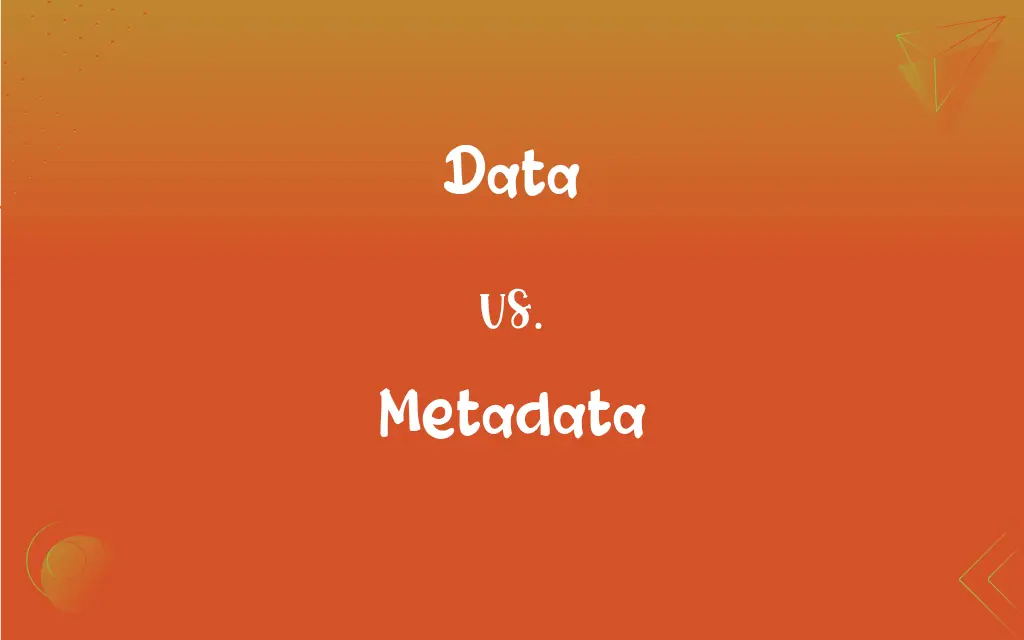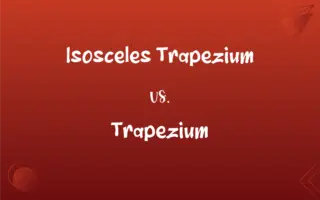Data vs. Metadata: What's the Difference?
Edited by Aimie Carlson || By Janet White || Published on February 17, 2024
Data is raw information or facts, whereas metadata is data about data, providing context or additional details about the main data.

Key Differences
Data refers to raw facts and figures, the basic information without context or interpretation. Metadata, on the other hand, provides information about this data, like the source, format, or creation date, thereby adding context.
When we collect data, such as measurements or statistics, it’s the primary content. Metadata is secondary, describing the properties or characteristics of this primary data, such as file size or author.
In computing, data can be any content, numbers, or information. Metadata is the systematic description of this data, like tags or categories, which helps in organizing or finding the data efficiently.
For a document, the text within is the data. The document's title, author name, modification dates, and file type are metadata, which describe aspects of the data without being part of the core content.
Data is what we analyze to gain information, such as survey responses. Metadata in this scenario could include when and how the survey was conducted, providing a framework to understand the data better.
ADVERTISEMENT
Comparison Chart
Definition
Raw, unprocessed information.
Information describing the data.
Example
Text in a book.
Author, publish date of the book.
Role
Primary content.
Contextual or descriptive information.
Purpose
To convey information directly.
To facilitate the understanding or management of data.
Usage
Analyzed or interpreted directly.
Used to organize, find, or understand data.
ADVERTISEMENT
Data and Metadata Definitions
Data
Data are individual pieces of factual information recorded and used for the purpose of analysis.
The survey data revealed trends in consumer preferences.
Metadata
Metadata is data providing information about other data.
The photo's metadata includes the camera model and the date it was taken.
Data
Data consists of raw numbers or facts collected through observation or research.
The experiment's data indicated a strong correlation between diet and health.
Metadata
Metadata is a set of data that describes and gives information about other data.
The website's metadata helps improve its visibility in search engine results.
Data
Data is information in a form suitable for processing by a computer.
The satellite transmits data to the ground station for analysis.
Metadata
Metadata describes the properties or details of a data file.
The document's metadata shows it was last edited on January 1, 2024.
Data
Data is factual information used as a basis for reasoning, discussion, or calculation.
The data showed a 30% increase in sales last quarter.
Metadata
Metadata is structured information that explains, locates, or makes it easier to retrieve, use, or manage data.
The book's metadata in the library catalog includes its ISBN and genre.
Data
Data is information processed or stored by a computer.
The database stores data about customers and their purchases.
Metadata
Metadata is supplementary information about data, such as source, format, or links to other relevant data.
The metadata of the research paper includes keywords and the author's affiliation.
Data
Plural of datum
Metadata
Data that describes other data, serving as an informative label.
Most websites contain metadata to tell the computer how to lay out the content on the screen.
Metadata
(computing) Structured information about a file (date created, creator, software used to create, last modified, file format, file fingerprint, etc).
That photo's metadata suggests it was edited using Photoshop.
Metadata
Data about data;
A library catalog is metadata because it describes publications
FAQs
What is data?
Data is raw, unprocessed information in the form of numbers, text, images, or sounds.
Can metadata exist without data?
No, metadata is specifically information about data, so it cannot exist without data.
What are examples of data?
Examples include numbers in a spreadsheet, text in a document, or images in a gallery.
What is metadata?
Metadata is data that provides information about other data, such as description, format, or source.
How is data used?
Data is used for analysis, decision making, and to inform or support research and theories.
How is metadata used?
Metadata is used to organize, find, and interpret data, enhancing its usability and accessibility.
How does metadata help in digital libraries?
Metadata helps in organizing, searching, and retrieving information efficiently in digital libraries.
Is metadata important?
Yes, metadata is crucial for understanding, managing, and using data effectively.
What are examples of metadata?
Examples include file creation date, author name, or camera settings for a photograph.
What role does metadata play in databases?
Metadata in databases describes the structure, operations, and constraints of the data.
What is the difference between data and information?
Data is raw facts, while information is data that has been processed to be meaningful.
Can metadata be automated?
Yes, metadata can be automatically generated by systems or software.
Why is data privacy important?
Data privacy is important to protect sensitive information and maintain individual rights.
Can data become metadata?
Yes, in certain contexts, data can serve as metadata for other data.
Is all information considered data?
Yes, all collected information, in its raw form, is considered data.
Are file names considered metadata?
Yes, file names are metadata as they provide information about the file content.
How does metadata enhance web browsing?
Metadata improves search engine optimization and helps in better categorization of web content.
What is an example of metadata in social media?
An example is the timestamp or location tag on a social media post.
Is data always numerical?
No, data can be numerical, textual, visual, or auditory.
Can metadata be seen by everyone?
This depends on the system; some metadata is publicly viewable, while some may be restricted.
About Author
Written by
Janet WhiteJanet White has been an esteemed writer and blogger for Difference Wiki. Holding a Master's degree in Science and Medical Journalism from the prestigious Boston University, she has consistently demonstrated her expertise and passion for her field. When she's not immersed in her work, Janet relishes her time exercising, delving into a good book, and cherishing moments with friends and family.
Edited by
Aimie CarlsonAimie Carlson, holding a master's degree in English literature, is a fervent English language enthusiast. She lends her writing talents to Difference Wiki, a prominent website that specializes in comparisons, offering readers insightful analyses that both captivate and inform.































































